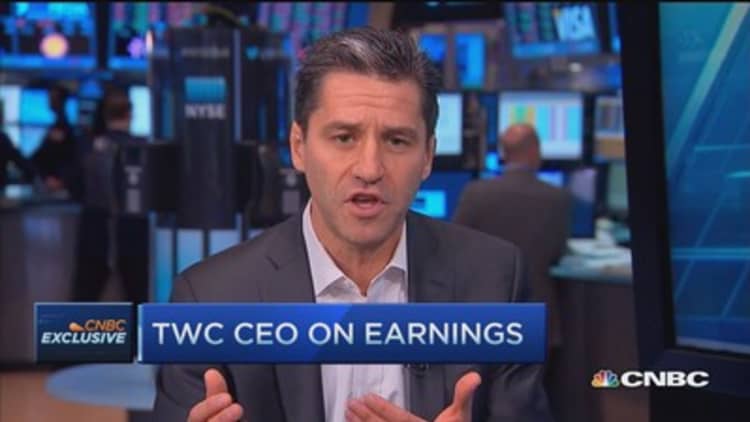
Online video is "the killer app" for the high-speed data world, and traditional cable providers cannot change consumer behavior, Rob Marcus, Time Warner Cable chairman and CEO, said Thursday.
"The idea that we're going to sort of stop what is otherwise a natural trend in customer behavior is ridiculous," he told CNBC's "Squawk on the Street." "I'd rather embrace it, try to give customers the best possible experience they have when they view online video."
Time Warner Cable will work to make its core cable product as robust as it can possibly be, he added, saying, "If we're competitively better, customers will choose us. If not, we're going to sell them high-speed data and increase their speeds on that front."
The company, the No. 2 U.S. cable TV operator, reported a 3.5 percent rise in revenue as it added more residential video and high-speed data subscribers than expected. It also added a net 30,000 residential video customers in the first quarter, more than double the 11,800 market research firm FactSet StreetAccount had estimated.
Time Warner Cable has been losing residential video subscribers since it started breaking out numbers for residential and commercial video subscribers since the fourth quarter of 2010.
Read More
"The subscriber performance we demonstrated this morning was the best subscriber performance ever," Marcus said, adding, "I think today's subscriber growth is tomorrow's revenue and OIBDA growth."
Despite the surprise in subscriber numbers, Time Warner Cable fell short of the Street's expectations for profit and revenue.
Net income attributable to the company's common shareholders fell to $458 million, or $1.59 per share, in the quarter ended March 31, from $479 million, or $1.70 per share, a year earlier. Revenue rose to $5.78 billion from $5.58 billion.
Analysts on average had expected earnings per share of $1.87 on revenue of $5.83 billion, according to Thomson Reuters I/B/E/S.
The company is in good shape today in part because it negotiated to maintain control of its operations throughout preparation for a scuttled acquisition by Comcast. Marcus said he made the unusual decision to forgo a breakup fee in exchange for "a broad degree of latitude in how we ran the business between signing and closing."
"I thought that was critical, and lo and behold, as I sit here today, I think that was a great trade because, irrespective of what the breakup fee might have been, we are a more valuable company because of the way we were able to run the business in the interim," he said.
Comcast dropped its bid to purchase Time Warner Cable last week as it became increasingly likely the Department of Justice would move to block the deal. Officials told CNBC the department was chiefly concerned that Comcast would control about 60 percent of the nation's broadband connections were the transaction to go through.
Read MoreHow the Comcast/Time Warner Cable deal fell apart
Charter Communications and Time Warner Cable are likely to meet next week to discuss a possible deal, sources told CNBC on Wednesday.
People close to the situation expect meetings will take place after Time Warner Cable reports earnings, not likely this week, but highly probable next week. The view is that any overture from Charter will be private in nature.
Marcus declined to comment on future deals and said Time Warner Cable would continue to be guided by a single principle in regard to mergers and acquisitions: do whatever will maximize value for shareholders.
"Whether that takes the form of running the company as well as we possibly can as a stand-alone, or engaging in M&A as a buyer or a seller, the same principle applies, maximization of shareholder value," he said.
Charter did not respond to a request for comment.
—Reuters contributed to this story.
Disclosure: Comcast is the owner of NBCUniversal, the parent company of CNBC and CNBC.com.


